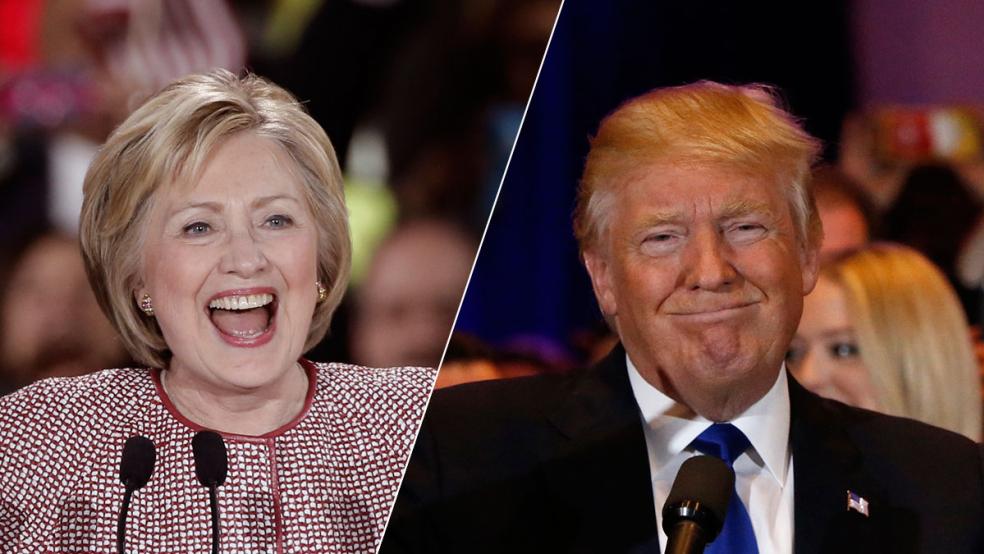Donald Trump and Hillary Clinton are so focused on winning the presidential election this fall that budgetary navel gazing is pretty low on their priority list.
While Trump, Clinton and Sen. Bernie Sanders of Vermont, the long-shot Democratic candidate, have all unveiled highly ambitious tax and spending plans, they are far more intent in gaining political advantage with voters than pondering the long-term impact of their proposals on the economy, the budget and the long-term national debt.
Related: Clinton Moves Towards Sanders on ‘Medicare for All’
But two formidable budget experts — former Congressional Budget Office directors Robert D. Reischauer and Douglas Holtz-Eakin — warned that all three of the candidates are headed down a perilous fiscal path absent some important mid-course corrections in their thinking, before one of them becomes president in January.
Government red ink is on the rise again after years of declining deficits. The CBO projects that the federal debt will rise by 50 percent to $21 trillion by 2024 absent dramatic change in federal spending and tax policy. According to the latest estimates of the Committee for a Responsible Federal Budget, Trump’s promised tax cuts would add $12.1 trillion to the debt over the coming decade. Sanders would add from $2.2 trillion to $14.9 trillion with massive social spending programs. Clinton would add about $200 billion to the debt with spending programs exceeding her proposed tax increases.
“In one sense, the campaigning on both sides has been irresponsible,” Reischauer, a liberal-leaning scholar, declared during a session on the next presidency during the 2016 Fiscal Summit of the Peter G. Peterson Foundation* in Washington.
“Put simply,” noted Holtz-Eakin, a Republican, “the federal budget is a danger to the U.S. economy, which is already projected to grow at a rate of only about 2 percent per year.”
Related: Trump Replaces His Untenable Debt Fix with a Different One
“Doing nothing is not an option, as [the next president’s] legacy would be to bequeath to the next generation a standard of living unworthy of this nation,” he added.
Reischauer and Holtz-Eakin have plenty of firepower as budget and economic gurus.
Reischauer served as CBO director from 1989 to 1995 and subsequently headed the Urban Institute from 2000 to 2012. His research and interests range from the federal budget and health policy to income distribution and economic growth. He was one of two public trustees of the Social Security and Medicare Trust Funds from 2010 to 2015.
Holtz-Eakin was chief economist of the President’s Council of Economic Advisers during the administration of President George W. Bush and later headed the CBO from 2003 to 2005. He advised Arizona Sen. John McCain’s 2008 Republican presidential campaign and currently is president of the American Action Forum.
Related: Trump Would Risk the ‘Full Faith and Credit’ of the US
While the two experts have different economic and political worldviews, they are in firm agreement that some of the most important subjects — including the long-term debt and the need for reform of the federal tax code, government regulations and major entitlement programs — are getting short shrift.
“A brighter future is achievable by focusing on what is driving the structural budgetary challenges confronting the nation,” Holtz-Eakin wrote in a memorandum outlining his views on what the next president and Congress must do. “Addressing the rapid growth of health, retirement and other entitlement programs; the nation’s broken tax code; the rising regulatory burden; and the U.S.’s irrational immigration system will improve the nation’s fiscal outlook and growth potential.”
Reischauer agreed in his memo, offering “unvarnished generic advice” to the next president and Congress. “Although budget deficits and debt did not seem to be important issues for the voters in November, the public, fiscally conservative members of Congress, and markets are likely to become increasingly concerned if deficits continue to rise as they are projected to do under a continuation of current policies.”
None of the three remaining presidential candidates have expressed much concern about the deficit or the threat of Social Security, Medicare and other major entitlement programs running out of money or busting the budget. Trump, the presumptive GOP presidential nominee, has pledged to protect Social Security from cuts and says he believes that he can substantially reduce the national debt without raising taxes by reducing “waste, fraud and abuse” in government.
Related: As Trump Turns to the General Election, He Flip Flops on Policy
Sanders favors a major expansion of Social Security benefits and creation of a raft of new social programs, including national health care. Clinton favors an increase in health care coverage and enhanced Social Security benefits, along with other new programs, but has vowed to pay for most of them by raising taxes. This week she disclosed that she might support expanding the availability of Medicare to Americans under the age of 65.
Sen. Lindsey Graham (R-SC), one of the unsuccessful GOP presidential candidates, said today at the conference that the deficit was among “the least talked about issues” throughout the campaign.
Reischauer and Holtz-Eakin think the remaining candidates are kidding themselves — or kidding the voters — and that far more serious consideration of a long-term debt reduction strategy is essential before the U.S. strays once again into a debt crisis.
“Growing deficits and increasing debt levels will reduce the nation’s capital stock, slow the growth of productivity and wages, limit policy makers’ ability to employ fiscal policy to combat future recessions, and expose the nation to greater risk of fiscal crises,” Reischauer wrote.
* Pete Peterson funds The Fiscal Times, an independent news and opinion organization, as a private venture. The Fiscal Times is not associated with The Peter G. Peterson Foundation.





